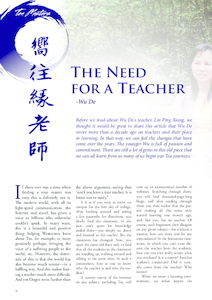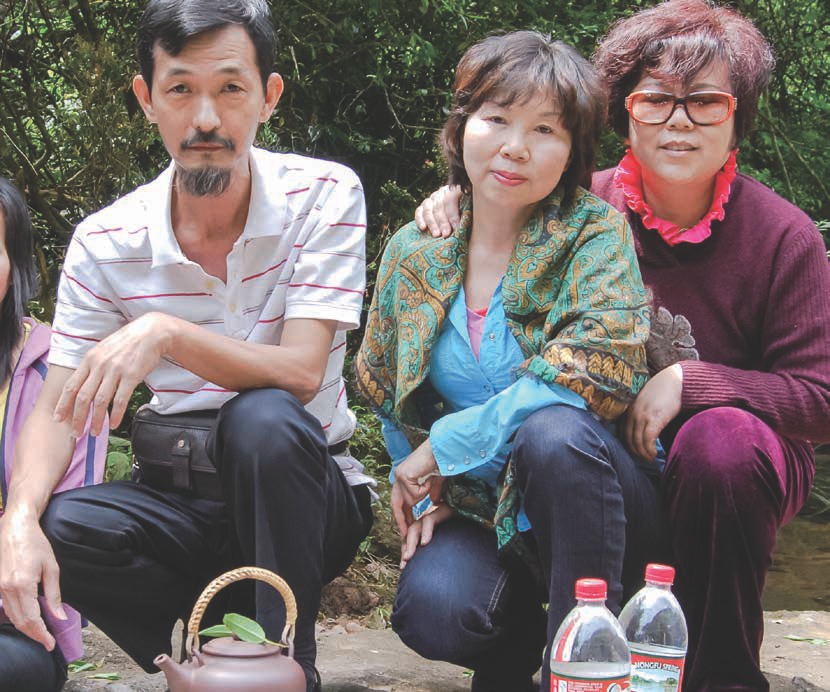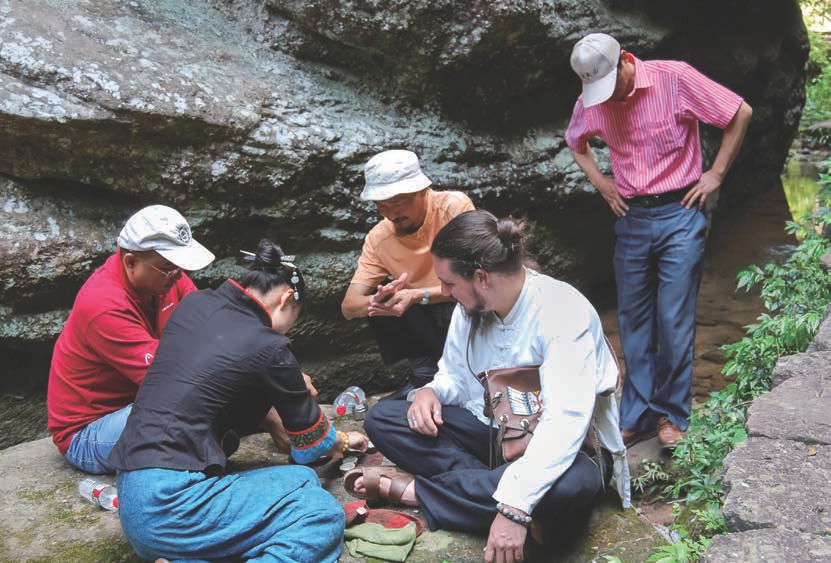
 |
|
If there ever was a time when finding a true master was easy, this is definitely not it. The modern world, with all its light-speed communication, the Internet and travel, has given a voice to billions who otherwise couldn't speak. In many ways, this is a beautiful and positive thing: helping Westerners learn about Tea, for example; or more genuinely perhaps, bringing the voice of a suffering people to the world, etc. However, the downside of this is that the world has also become much noisier - in a baffling way. And this makes finding a teacher much more difficult. And yet Dogen went further than the above argument, saying that "until you have a true teacher, it is better not to study."
It is as if you were to arrive on campus for the first day of college. After looking around and asking a few passersby for directions, you finally find the classroom. In the past, one's quest for knowledge ended there - you simply sat down and listened to the teacher. But the classroom has changed: Now, you open the same old door only to find that all the students in the classroom are standing up, walking around and talking at the same time. In such a commotion, how is one to know who the teacher is and who the student?
A cursory survey of the Internet on any subject, including Tea, will turn up an astronomical number of websites. Searching through them, you will find thousand-page-long blogs, and after reading through them you then realize that the person making all this noise only started learning one month ago, and, like you, has no teacher. Of course, such beginners then disagree on any given subject - for without a mentor, how can there ever be any concordance? In the boisterous classroom, in which you can't even discern the teacher from the students, how can you ever really accept what you overhear? Is it a rumor? Another student's conjecture? Did it actually come from the teacher? Who knows?

When we enter a learning environment, we either respect the teacher or respect the institution that hired him/her. Though we are encouraged to think for ourselves, to question the teacher's words and evaluate them through our own reason and experience, there must be some level of acceptance. If we are busy questioning every single minute detail of every single lecture, our learning progresses at a snail's pace. Imagine, then, how slowly one develops in an environment where we can't even find the teacher!
I am not in any way suggesting that the voice of those beginners, expressing themselves on the Internet or in person, should be suppressed. That would be a violation of their human right to free speech. I am, instead, merely pointing out how confusing this milieu is to the beginner who is seeking genuine guidance, for when everyone is presenting different views, and it is unclear who the actual teacher is, then the only recourse is to go at it alone. Also, there is often the misguided notion that the one who blogs or writes the most or the longest is necessarily an "expert", as if making the most noise qualified one. And that is the implicit idea that I think is detrimental to one's progress in any art, especially one that leads into the heart of our spiritual selves like Tea.
I have a friend who blogs on other topics who often asks me "What should I blog about today?" I find that question so ridiculous. If you don't have anything to say, why do you feel such a strong need to speak? Similarly, in the Tea world, I've noticed that when I ask certain beginners if they have read any publications that have articles and/or interviews with real masters, they respond in the negative. When I wonder why, they say "I'm too busy." Granted, we're all busy; but then I notice that some of these unfortunates spend thirty minutes or an hour blogging about Tea regularly, which then basically leads me to the conclusion that such a person would rather hear his own voice than someone like Zhou Yu or Chen Zhi Tong - people with decades of experience who are often sharing it freely. How can such a person ever hope to progress? Is it not obvious that you can't speak and listen/learn at the same time? Apparently not, at least for some.
Technically speaking, you can explore Tea on your own; you can doubt everything anyone says and just do everything by trial and error. However, the world of Tea is incredibly deep and takes decades to master even under the guidance of a real teacher, so such a path would extend into centuries we don't have. What's more, most all the greater heights of Tea, the inexpressible sensations and spiritual inclinations, cannot be expressed through words. One has to be initiated into them. Most all the subtle variations in preparation, the differences in Qi, the proper use of teaware, etc. have to be directly experienced, and that can't happen if the teacher isn't there to show you how to do it, and what to look for once you have experienced it. There are countless things I know about Tea - from very little things about how to hold something, for example, to deep and profound spiritual truths - that I never would have discovered on my own, not in a hundred lifetimes devoted to Tea. Ultimately, one must not give up: no matter where or who you are, don't ever abandon the hope that you can find a true teacher; and more importantly, don't ever let go of the fact that finding him or her is necessary. We all need guidance!
"The disciple is like wood, and the teacher resembles a craftsman. Even if the wood is good, without a skilled craftsman its extraordinary beauty is not revealed. Even if the wood is bent, placed in skilled hands its splendid merits immediately appear. By this you should know that realization is genuine or false depending on whether the teacher is true or incompetent."
Unfortunately, one other drawback to the aforementioned free speech is that it also opens the gates to all the charlatans, profiteers and other negative influences. In fact, many Westerners are turned off from masters, and therefore never find one and make any progress, because they are either suspicious or have some experience with such a fraud. My father always says, "I'll never file my teeth and dye my hair purple, but I wouldn't want to live in a world where people weren't free to do so." Similarly, I think it is best to recognize such people, learn some discrimination, and then ignore them - moving on to face our own destinies.
Our search is confused by any number of so-called masters with financial agendas, or control issues, etc.; and because of that, one important place to start one's search for a teacher has become a foundation of skepticism towards any teacher that has a financial interest in their teaching. There are all kinds of "masters" in Asia that subtly incorporate their business plans into their teaching. There are even formal institutions that charge large sums of money to "teach" you about Tea. They then have a Tea shop adjacent to or beneath their school, and since the class will all be using their tea and teaware, and you will be tested using it, "we suggest you pick some up in order to practice properly." In essence, they charge you a fee to learn why their tea and teaware is superior, how to use it to brew tea, and then eventually how to graduate and go out in the world as a billboard that advertises their products to others. We know of several such teachers and groups.

All kinds of vendors have "information" portions of their online shop, website or blog which teach about Tea; but it all revolves around the reasons why their tea is better, how to brew their tea, where they got their tea, etc. Is it any wonder intelligent people get turned off? Despite that, I would still assert that the quest for a real teacher is worthwhile for two reasons: firstly, as Dogen said, you can't make true progress without a teacher; and secondly, giving up simply because there are charlatans who want your money is a bit like never dating because you could get hurt. (I am very much a 'better to have loved and lost' kind of person.)
Master Dogen also said that if one is quiet, the "stream's water will tell us of the source." Eventually, in drinking a person's Tea, one will find out the source of their wisdom, be it the Dao or a financial agenda - though it may take us a few sessions to catch on. Most of the highest masters in any Dao don't charge money for teaching. In kung fu, for example, it has been forbidden since ancient times for the master to receive financial reimbursement of any kind, which will only pollute the teaching. Once money enters into the equation, the baser human emotions - like greed, jealousy, etc. - also get involved, and these are the real pollutants. Things start getting modified, compromises made, and soon the Truth spirals away into organization. This is one of the reasons I have the utmost respect for this magazine, its founders and contributors.
That said, I personally believe that there is no problem combining what one loves most with one's livelihood, but I think that if you are going to make money through tea, then just sell tea, plain and simple - don't charge me to learn about it. I do know some genuine masters that make a living selling tea, but they don't ever charge to learn about it, and they rarely focus their lessons on why their tea is so much better than others, which leads me to another important point.
There are so many genuine Tea masters in the world, all with wide-open heart-kettles that are busy pouring cup after cup of wisdom as you read these very words; and many of them are in the most unlikely places. But you have to find them. They are looking for you— that is true—though it is you who must go to them, and with an empty cup.
True masters never wish to possess their students. My master always says that "if you have a strong desire to have students, you're not ready for them." If the method my master is teaching is in fact the truth, why should he worry if I want to compare it to other methods? If a tea truly is better, it will stand up to a side-by-side comparison with an inferior tea. In fact, by exploring and testing principles, we not only develop faith in their efficacy, we also learn how to better appreciate their superiority. For that reason, my master doesn't just allow me to seek out other teachers and teachings, he encourages it. He loves when I come back with things I learned elsewhere, to discuss and compare. It shows growth. Masters who suggest that “Our way is the only way; there is no other”, and imply that to try another practice is to leave this one, are often insecure in their wisdom, for if it really was the best way, you wouldn’t need to worry about whether it could stand up to other traditions or not. As much as those who teach for financial reasons, there are those who do so for ego: they get their satisfaction from being above others, and want complete devotion from their students, as well as recognition of the fact that they are “higher”. The truly high masters I’ve met were all childlike, humble, modest and unaffected— the kind of people you could pass by very easily in a crowd. “The empty drum makes the most noise” as they say.
Now that we’ve gotten the negative stuff out of the way, let us turn to the positive: there are so many genuine Tea masters in the world, all with wide-open heart-kettles that are busy pouring cup after cup of wisdom as you read these very words; and many of them are in the most unlikely places. But you have to find them. They aren’t going to come and ring your doorbell. They are looking for you—that is true—though it is you who must go to them, and with an empty cup.
I think it is the same with highend teas as it is with masters; and one of my teachers always says that, “as the man seeks the Leaf, the Leaf seeks the man.” You still have to go out and explore, though. You have to use your intuition, and approach each situation as a new and unique encounter. If you are too hung up on suspicions based on the negativities we discussed earlier, or past experience, you will close yourself off and drive away the real masters. There are plenty of people who are willing to honor and respect them, to use the opportunity to develop their own humility, so why would the master want a disciple who will treat them suspiciously and argue with them? Be open to the idea that you can find a teacher, and go in search of them. If you follow your heart, you will find them and they will find you. In India, there is an ancient saying: “When the student is ready, the master will appear.”

If humility, devotion and respect were easy, we’d all be masters. It is hard to recognize your own lack. However, one fundamental preliminary to any kind of learning whatsoever is the implicit admission that you don’t know. There is no learning without this. If you already have the answer, what is there that anyone can teach you? I have seen many people walk right by a true master for this very reason; or, as I mentioned earlier, be handed a book or magazine like this one, full of great information, which they cast aside in favor of the sound of their own voice. Learning to listen, and learning itself, is one of the most difficult skills to master. Emerson said “It took me five years to learn to speak the English language and fifty to learn to hear it.” There is no point in going out to look for a teacher if you’re just going to dismiss him or her the moment you meet them.
Don’t get confused, though. As I said earlier, any true master will encourage rationality, healthy criticism and experiential understanding, allowing you to explore other media for information and come to your own conclusions. The true master only proves his or her worth when the student breaks free of him or her. If they remain students forever, then the teacher hasn’t done a very good job. Similarly, some educational philosophers suggest that students never fail, only teachers; and that the failure of a student to graduate can only reflect the effort, or lack thereof, of the teacher. While that argument may be a bit strong in some delinquent cases, I agree with the fundamental spirit of it: the real master wants his or her students to have a so-called “graduation”— for lack of a better term— and go off on their own to develop their own wisdom, eventually becoming a master themselves with their own students. That is how the tree seeds and spreads.
In the end, you can’t complain that you have no teacher if you aren’t open to expanding your search, or if you feel your cup is full and that you already know the answer. The willingness to travel is the first step in any journey. How far would you go to find a Tea master? To achieve mastery yourself? For it is my opinion—and far more importantly, the opinion of such great masters as Dogen-zenji—that without such a teacher, you’ll never find the inner sanctum and progress in real understanding towards the point at which you can participate in and create your own path towards artistry. May all of you who haven’t already, find such a kind-hearted guide to lead you to the place where Tea and Zen are of one flavor.
